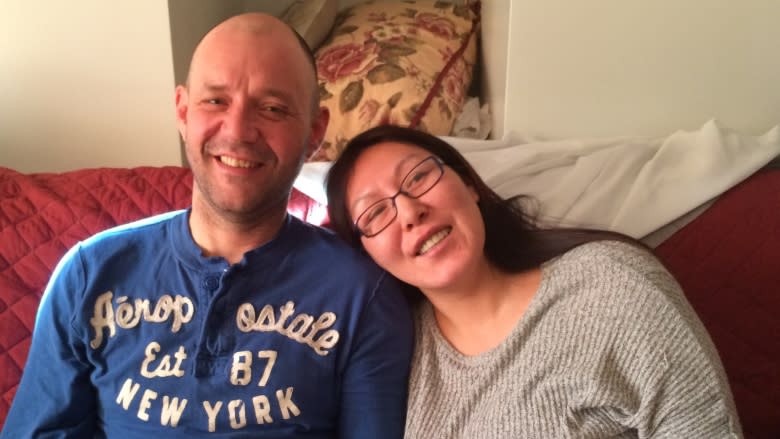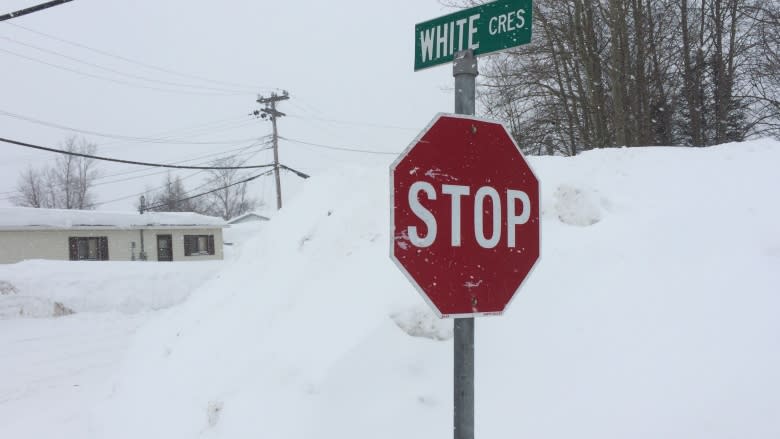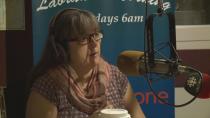After battling addiction, Labrador couple looks for home to raise baby
When Corey Saunders got out of jail last summer, he fell right back into the same old pattern.
Wake up at 9:30 to be at the liquor store when it opened at 10, a piece of toast before heading out for the day. His mother doesn't allow drinking in her apartment.
It's a short walk to the only liquor store in Happy Valley-Goose Bay. Just around the corner and a few minutes down Tenth Street. On the way, he'd duck into the woods behind Service Canada.
On warm summer days, there might be a few people sleeping on top of tarps and under thin blankets among the black spruce trees.
Corey is the first to admit, the place was filthy. Empty bottles and cigarette butts, broken glass, food wrappers. This is where he used to spend his days, drinking with a few friends and, most important, Augusta.
Corey, who's 43 years old, has known Augusta Onalik for years. They lived on the same street and often saw each other passing by.
The first thing he noticed about her was her good looks: long black hair, a slim frame. The first thing Augusta noticed about Corey was his piercing blue eyes.
The initial attraction was superficial, but Augusta and Corey's connection is deep. They have so much in common — they've both battled addiction, been in and out of jail, and are now trying to stay on the straight and narrow.
They've been together for three years and are expecting a baby in September. But to keep their family together, Corey and Augusta will have to fight the urge to fall back into old habits.
They'll also need to find a place to live.
'I would have died if I didn't quit'
Neither Corey nor Augusta has ever been completely homeless. Corey's been staying with his mom for the last five years. First, in a one-bedroom apartment, his bed a foam mattress on the floor, then in a bigger place when his mom moved.
Augusta, 32, lived in a supportive housing complex with two roommates, but she said it wasn't a good fit.
"I was really uncomfortable staying there," she said. "I didn't like being watched or monitored."
Back when they were drinking, the couple would meet each morning and head to the liquor store. They'd buy a 750-ml bottle of Smirnoff vodka, because it's easier to drink than most liquors, Augusta explained.
Eventually, she moved into the apartment with Corey and his mother, but the long days of drinking were starting to take a toll.
"I was sick of the way I was living," Corey said of those first two months after he left the correctional centre in August.
"I was going to end up back in jail."
For Augusta, the toll was hazier, harder to explain. And it was haunting.
"I would have died if I didn't quit, the way my life was going. All the drinking caused a lot of things," she said. "Like me getting beat up or … going to [the] drunk tank. And the next morning, don't know what happened to me."
On the suggestion of their probation officer, Corey and Augusta entered a 90-day treatment program in North West River.
It was hard work, they both agree. They saw each other in the dining hall but weren't allowed to talk.
"I'm not going to say it was easy, but the program really helped me a lot," Corey said.
"I had to work on me."
Keeping the family together
Homelessness and addiction often go hand in hand, according to Michelle Kinney, deputy minister of Nunatsiavut's department of health and social development.
"Even when people are clean for a period of time, they still face a lot of challenges. Lots of people during their addictions have burned some bridges."
That's why Kinney would like to see another housing model.
While supportive living didn't suit Augusta, who had to share a home with two roommates, Kinney thinks it could work in a family setting.
In practical terms, it would mean help finding an affordable place to live and regular visits with support staff and social workers. The Nunatsiavut government is already developing a model in Nain and Hopedale.
"In Happy Valley-Goose Bay at the present time, there is no model, but definitely something that is needed," Kinney said.
"Families need a way to prevent their children from going into care, and lots of supports and wrap-around services."
Tight quarters
"Basically homeless" is how Corey describes his situation.
"I've got a place to sleep but it's not my own."
When the baby comes in September, his mother's two-bedroom apartment may start to feel cramped.
It's the kind of stress neither new parents nor recovering addicts need. Having a place to call their own would give the couple some peace of mind.
"We'd be more comfortable in our relationship. We'd have some security," Corey said. "My mom is great … but anything could happen."
Tough rental market
Since 2013 when construction started on the Muskrat Falls project, rental prices have spiked in Happy Valley-Goose Bay. Even would-be tenants with high-paying jobs struggle to find places to live.
A two-bedroom apartment typically goes for about $1,500 monthly.
"I was on my own since I was 19," said Corey. "But now I can't afford rent here. Low-income housing is the only way to go."
On Monday, Corey started a short-term carpentry job, and he's been handing out resumés in hopes of finding something permanent. He's cautiously optimistic.
"I could pass a drug test now. First time I could say that in three years," he laughed.
But given the low housing stock, and Corey and Augusta's lack of recent references, competition for an apartment will be stiff, even if they can scrape together enough money for rent.
Big changes
So many things have changed for Corey and Augusta these last few months. Recovery. Pregnancy. The pair are learning about each other like everything's new, even though they've been together for three years.
"I don't know sober Augusta," Corey mused. "I don't even know sober Corey. Since I was 13, I've been battling addiction."
Their success as a couple and as a family will depend on sticking to the recovery program. Attending meetings at the treatment centre, being honest and accountable, making peace with their pasts.
Having their own home — a safe place all their own — could make all the difference.
"It would take a weight off my shoulders," Augusta said. She's been calling landlords, sending emails.
It's an uphill battle, but for the first time in years, there's promise.
"With us dealing with our addictions and recovery, I'm starting to gain hope," Corey said. "I can see a light at the end of the tunnel."










